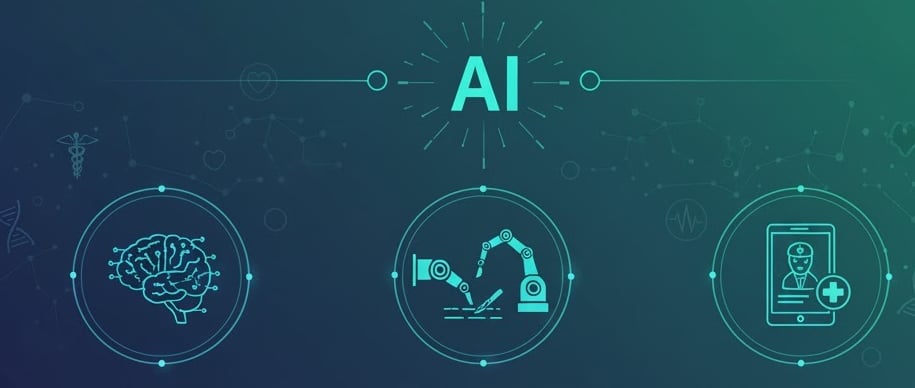ROLE OF ARTIFICIAL INTELLIGENCE IN THE MEDICAL FIELD.
Artificial Intelligence (AI) has emerged as a transformative technology in the medical field, offering innovative solutions for disease diagnosis, treatment planning, patient monitoring, and healthcare management. By analyzing large and complex clinical datasets with high precision and speed, AI supports medical professionals in making accurate and timely decisions. Applications such as AI-assisted imaging, robotic surgeries, predictive analytics, personalized medicine, and virtual health systems have significantly enhanced healthcare quality and patient outcomes.
ARTICLES


Role of Artificial Intelligence in the Medical Field
Muskan Ayaz, FH Medical College, Agra.
Introduction
Artificial Intelligence (AI) is no longer just a concept of science fiction—it hasbecome a vital part of modern healthcare. From diagnosing diseases faster thandoctors to predicting patient outcomes, AI is transforming the way medicineispracticed. For medical professionals, AI acts as a digital assistant that learns, analyses, and helps in decision-making, making healthcare more precise, efficient, and accessible.
1. Understanding Artificial Intelligence in Medicine
Artificial Intelligence refers to computer systems capable of performingtasksthat usually require human intelligence.
In the medical field, AI uses algorithms and data analysis to help in:
Diagnosis: Detecting diseases from scans or lab results. Treatment Planning: Suggesting the most effective treatment options.
Patient Monitoring: Tracking vital signs and alerting doctors in real-time. Research: Analysing large data sets for drug discovery and epidemiological studies.
2. AI in Medical Diagnostics
AI has proven to be a game-changer in diagnosing diseases, especially where early detection is crucial.
a. Radiology and Imaging
AI algorithms can interpret X-rays, CT scans, and MRIs faster andmoreaccurately than humans in many cases.
For example, Google’s DeepMind AI can detect over 50 eye diseaseswithaccuracy comparable to ophthalmologists.
AI tools like IDx-DR are FDA-approved for detecting diabetic retinopathy, enabling screening even in primary care settings.
b. Pathology
Digital pathology, combined with AI, helps in identifying cancerous cellswithhigher precision.
Tools such as PathAI are helping pathologists reduce errors in cancer diagnosis. 3. AI in Predictive and Preventive Medicine
AI doesn’t just help treat — it helps prevent.
By analysing patterns in patient data, AI can predict future diseases. Real-Life Example
IBM Watson Health analyses a patient’s genetic profile and predicts cancer risksor drug responses.
AI-based wearable devices like Apple Watch and Fitbit can detect irregular heartrhythms, prompting early medical intervention for conditions sucyhasatrial fibrillation. These technologies support the shift from reactive medicine (treatingafterillness) to preventive medicine (treating before illness).
4. AI in Surgery
Robotic-assisted surgeries are among the most remarkable AI applications in medicine.
Systems like da Vinci Surgical System allow surgeons to perform complex procedures with enhanced precision, minimal invasiveness, and quicker recovery times.
AI-powered robots can filter hand tremors and suggest the most accuratecuttingangles.
In neurosurgery, AI-based navigation systems help surgeons locatetumorsprecisely, reducing risks.
Example
In 2020, a robotic system performed a spinal surgery in China with minimal human involvement — a sign that the future of surgery is intertwined withAI.
5. AI in Drug Discovery and Development
Developing new drugs is costly and time-consuming. AI speeds up thisprocessby predicting how different molecules will behave in the body.
Examples-
During the COVID-19 pandemic, AI was used to identify potential antiviral compounds in weeks instead of months.
Pharmaceutical companies like Pfizer and AstraZeneca now rely on AI for drug design and clinical trials.
6. AI in Personalised Medicine
Every patient is unique — and AI helps personalize treatment plans accordingly. By studying genes, lifestyle, and environment, AI systems recommendtherapiesbest suited for the individual.
Example
In oncology, AI models analyse a patient’s tumour genomics to suggest targeted therapies, improving survival rates.
In diabetes management, AI monitors blood glucose levels and dietary habits to give personalised diet and insulin advice.
7. The Future of AI in Medicine
The future holds promise for AI-driven healthcare:
1. Predictive models will foresee disease outbreaks.
2. Robots may handle emergency surgeries in remote areas. 3. Virtual doctors could provide 24/7 healthcare access to rural communities.
However, the ultimate goal is collaboration between human intelligenceandartificial intelligence — not competition. The empathy, compassion, andjudgmentof a doctor cannot be replaced by any machine.
Conclusion
Artificial Intelligence is not here to replace doctors but to empower them. It bridges the gap between human capability and medical complexity, ensuringfaster diagnosis, personalized treatment, and improved patient outcomes. As an MBBS student witnessing this digital revolution, I believe that the future doctor must be both medically skilled and technologically aware —because the stethoscope of tomorrow might just come with an AI chip.
In essence:
AI is not the future of medicine — it is the present, transforming healthcareonealgorithm at a time.